Economic Report: Determinants of Rising House Prices in the UK
VerifiedAdded on 2022/12/30
|10
|2124
|24
Report
AI Summary
This report provides an in-depth analysis of the rising house prices in the UK housing market. It begins with an executive summary and introduction, then delves into the background and economic context, including the impact of demand and supply, interest rates, real income, and inflation. The report examines the factors contributing to rising prices, such as population shifts, economic growth, and government policies. It also discusses the role of the government in addressing economic problems, including monetary and fiscal policies. The report highlights the impact of the COVID-19 pandemic and the influence of banks and foreign investments. The conclusion summarizes the key determinants of rising house prices and the importance of government intervention. The report also includes references to relevant books and online resources.
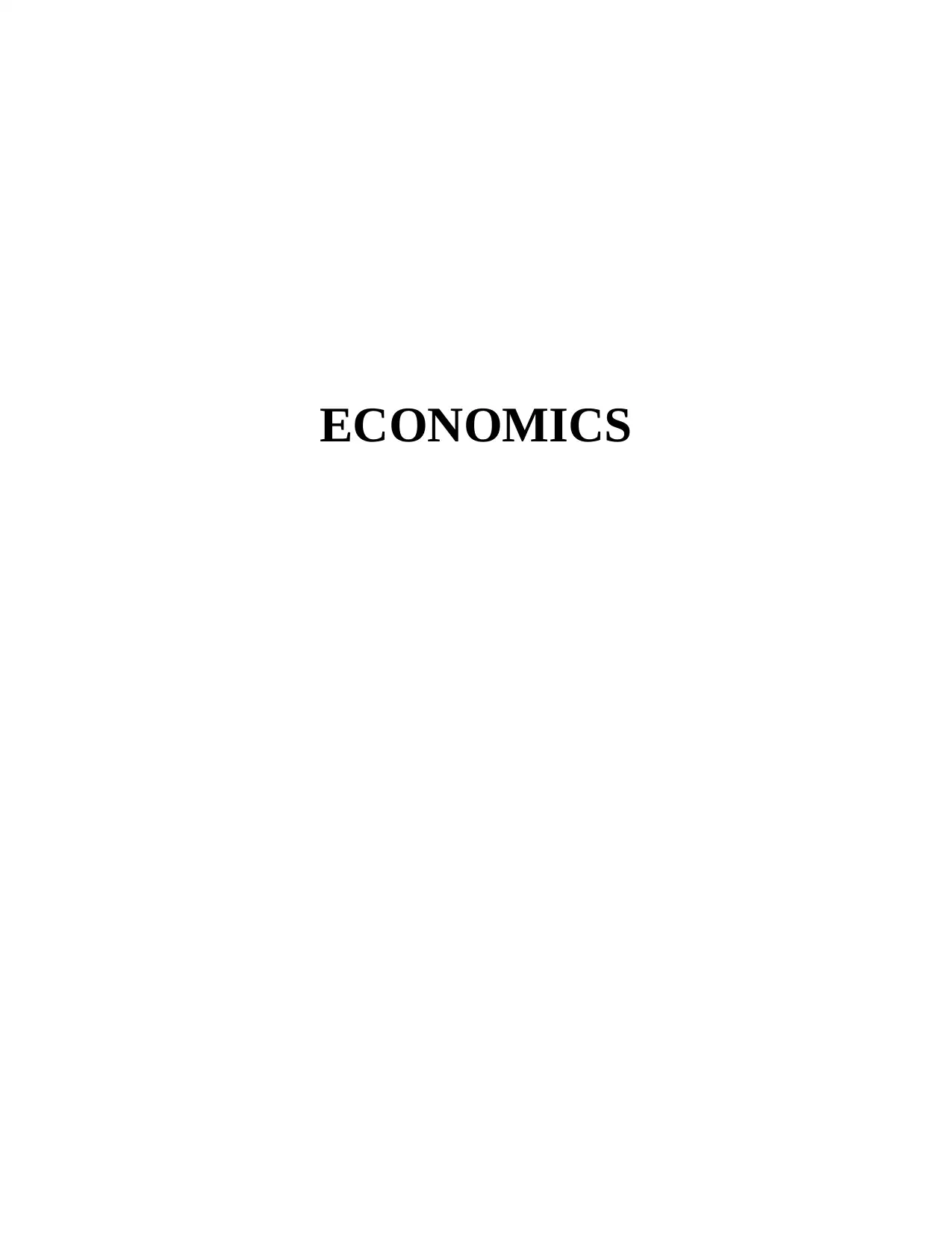
ECONOMICS
Paraphrase This Document
Need a fresh take? Get an instant paraphrase of this document with our AI Paraphraser
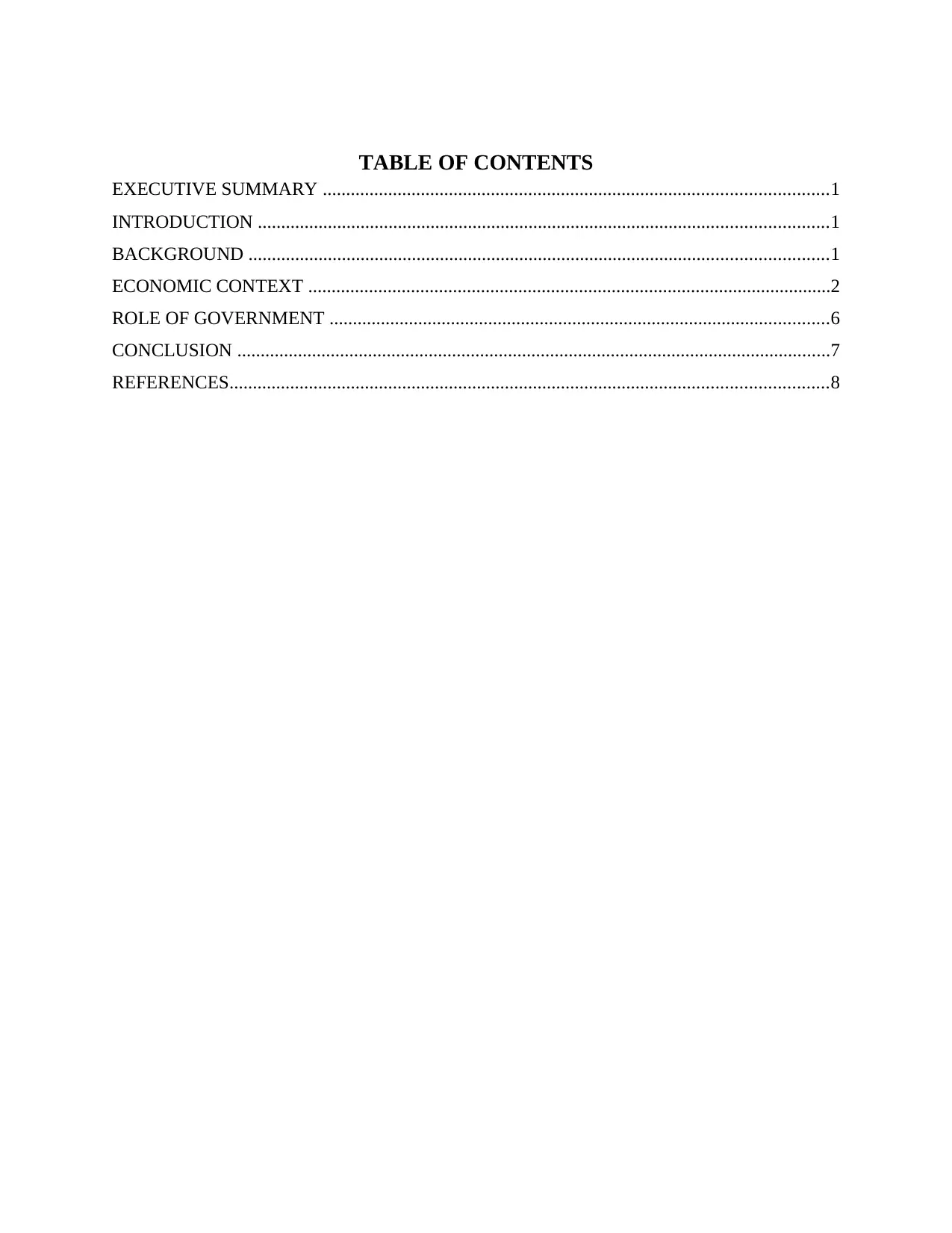
TABLE OF CONTENTS
EXECUTIVE SUMMARY ............................................................................................................1
INTRODUCTION ..........................................................................................................................1
BACKGROUND ............................................................................................................................1
ECONOMIC CONTEXT ................................................................................................................2
ROLE OF GOVERNMENT ...........................................................................................................6
CONCLUSION ...............................................................................................................................7
REFERENCES................................................................................................................................8
EXECUTIVE SUMMARY ............................................................................................................1
INTRODUCTION ..........................................................................................................................1
BACKGROUND ............................................................................................................................1
ECONOMIC CONTEXT ................................................................................................................2
ROLE OF GOVERNMENT ...........................................................................................................6
CONCLUSION ...............................................................................................................................7
REFERENCES................................................................................................................................8
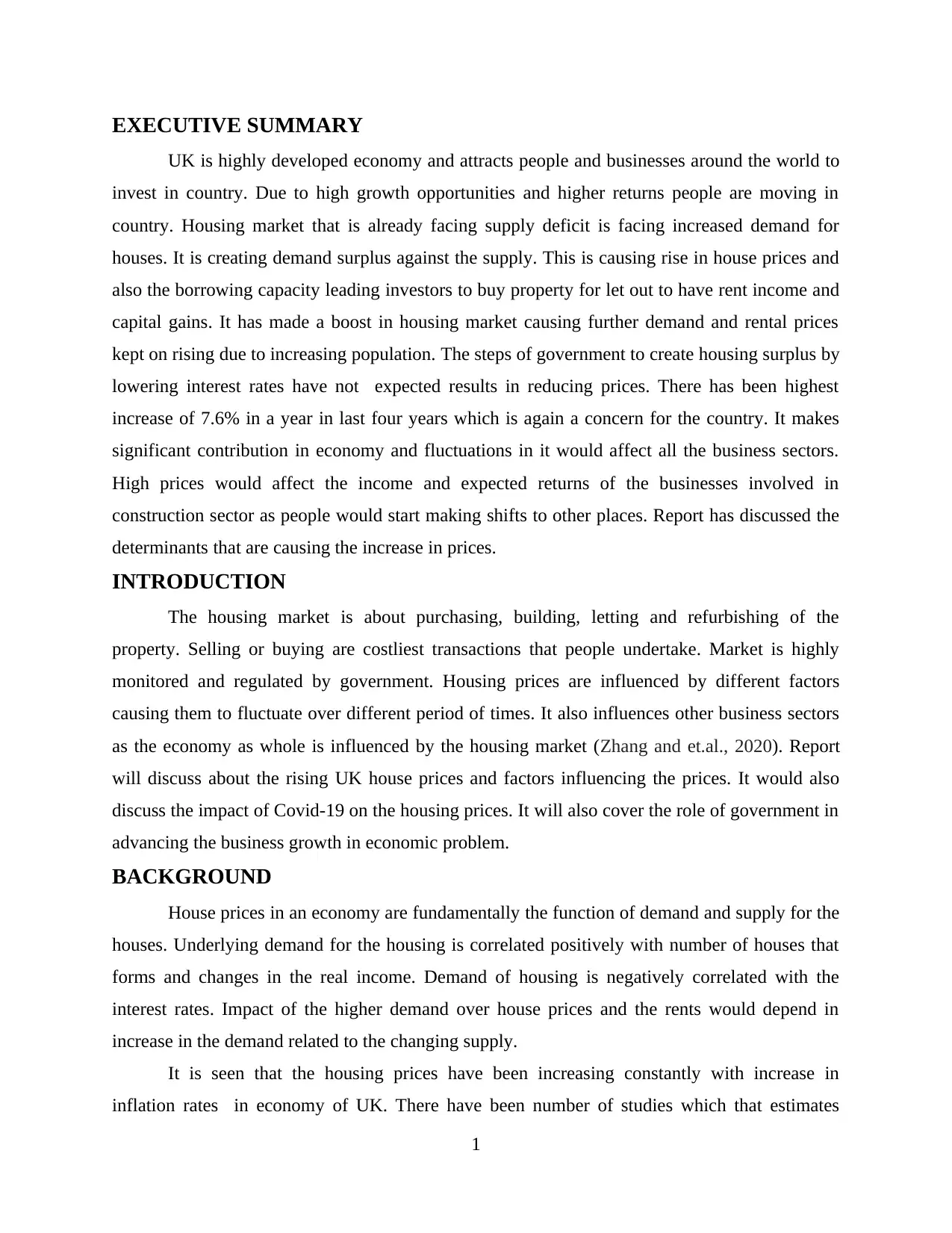
EXECUTIVE SUMMARY
UK is highly developed economy and attracts people and businesses around the world to
invest in country. Due to high growth opportunities and higher returns people are moving in
country. Housing market that is already facing supply deficit is facing increased demand for
houses. It is creating demand surplus against the supply. This is causing rise in house prices and
also the borrowing capacity leading investors to buy property for let out to have rent income and
capital gains. It has made a boost in housing market causing further demand and rental prices
kept on rising due to increasing population. The steps of government to create housing surplus by
lowering interest rates have not expected results in reducing prices. There has been highest
increase of 7.6% in a year in last four years which is again a concern for the country. It makes
significant contribution in economy and fluctuations in it would affect all the business sectors.
High prices would affect the income and expected returns of the businesses involved in
construction sector as people would start making shifts to other places. Report has discussed the
determinants that are causing the increase in prices.
INTRODUCTION
The housing market is about purchasing, building, letting and refurbishing of the
property. Selling or buying are costliest transactions that people undertake. Market is highly
monitored and regulated by government. Housing prices are influenced by different factors
causing them to fluctuate over different period of times. It also influences other business sectors
as the economy as whole is influenced by the housing market (Zhang and et.al., 2020). Report
will discuss about the rising UK house prices and factors influencing the prices. It would also
discuss the impact of Covid-19 on the housing prices. It will also cover the role of government in
advancing the business growth in economic problem.
BACKGROUND
House prices in an economy are fundamentally the function of demand and supply for the
houses. Underlying demand for the housing is correlated positively with number of houses that
forms and changes in the real income. Demand of housing is negatively correlated with the
interest rates. Impact of the higher demand over house prices and the rents would depend in
increase in the demand related to the changing supply.
It is seen that the housing prices have been increasing constantly with increase in
inflation rates in economy of UK. There have been number of studies which that estimates
1
UK is highly developed economy and attracts people and businesses around the world to
invest in country. Due to high growth opportunities and higher returns people are moving in
country. Housing market that is already facing supply deficit is facing increased demand for
houses. It is creating demand surplus against the supply. This is causing rise in house prices and
also the borrowing capacity leading investors to buy property for let out to have rent income and
capital gains. It has made a boost in housing market causing further demand and rental prices
kept on rising due to increasing population. The steps of government to create housing surplus by
lowering interest rates have not expected results in reducing prices. There has been highest
increase of 7.6% in a year in last four years which is again a concern for the country. It makes
significant contribution in economy and fluctuations in it would affect all the business sectors.
High prices would affect the income and expected returns of the businesses involved in
construction sector as people would start making shifts to other places. Report has discussed the
determinants that are causing the increase in prices.
INTRODUCTION
The housing market is about purchasing, building, letting and refurbishing of the
property. Selling or buying are costliest transactions that people undertake. Market is highly
monitored and regulated by government. Housing prices are influenced by different factors
causing them to fluctuate over different period of times. It also influences other business sectors
as the economy as whole is influenced by the housing market (Zhang and et.al., 2020). Report
will discuss about the rising UK house prices and factors influencing the prices. It would also
discuss the impact of Covid-19 on the housing prices. It will also cover the role of government in
advancing the business growth in economic problem.
BACKGROUND
House prices in an economy are fundamentally the function of demand and supply for the
houses. Underlying demand for the housing is correlated positively with number of houses that
forms and changes in the real income. Demand of housing is negatively correlated with the
interest rates. Impact of the higher demand over house prices and the rents would depend in
increase in the demand related to the changing supply.
It is seen that the housing prices have been increasing constantly with increase in
inflation rates in economy of UK. There have been number of studies which that estimates
1
⊘ This is a preview!⊘
Do you want full access?
Subscribe today to unlock all pages.

Trusted by 1+ million students worldwide
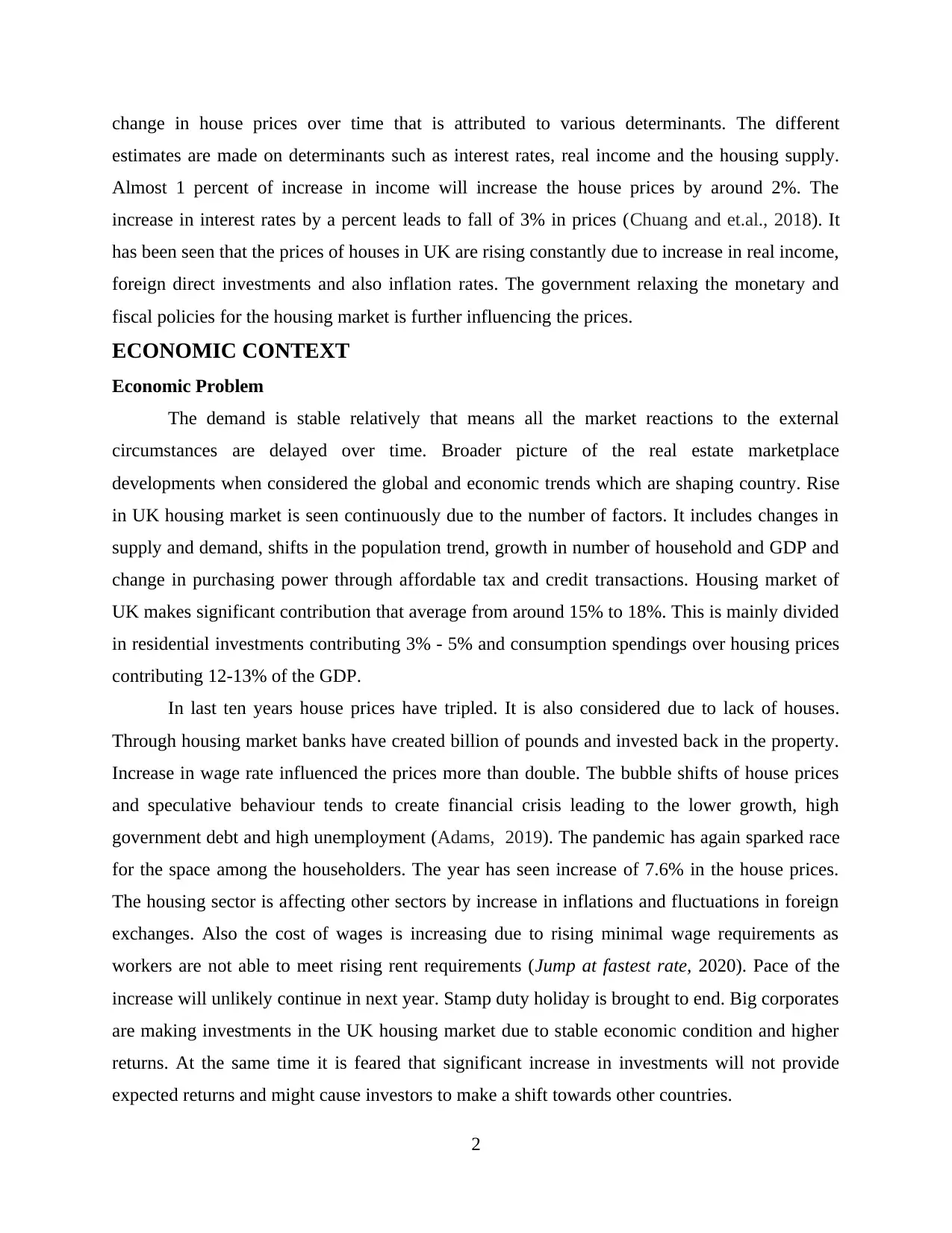
change in house prices over time that is attributed to various determinants. The different
estimates are made on determinants such as interest rates, real income and the housing supply.
Almost 1 percent of increase in income will increase the house prices by around 2%. The
increase in interest rates by a percent leads to fall of 3% in prices (Chuang and et.al., 2018). It
has been seen that the prices of houses in UK are rising constantly due to increase in real income,
foreign direct investments and also inflation rates. The government relaxing the monetary and
fiscal policies for the housing market is further influencing the prices.
ECONOMIC CONTEXT
Economic Problem
The demand is stable relatively that means all the market reactions to the external
circumstances are delayed over time. Broader picture of the real estate marketplace
developments when considered the global and economic trends which are shaping country. Rise
in UK housing market is seen continuously due to the number of factors. It includes changes in
supply and demand, shifts in the population trend, growth in number of household and GDP and
change in purchasing power through affordable tax and credit transactions. Housing market of
UK makes significant contribution that average from around 15% to 18%. This is mainly divided
in residential investments contributing 3% - 5% and consumption spendings over housing prices
contributing 12-13% of the GDP.
In last ten years house prices have tripled. It is also considered due to lack of houses.
Through housing market banks have created billion of pounds and invested back in the property.
Increase in wage rate influenced the prices more than double. The bubble shifts of house prices
and speculative behaviour tends to create financial crisis leading to the lower growth, high
government debt and high unemployment (Adams, 2019). The pandemic has again sparked race
for the space among the householders. The year has seen increase of 7.6% in the house prices.
The housing sector is affecting other sectors by increase in inflations and fluctuations in foreign
exchanges. Also the cost of wages is increasing due to rising minimal wage requirements as
workers are not able to meet rising rent requirements (Jump at fastest rate, 2020). Pace of the
increase will unlikely continue in next year. Stamp duty holiday is brought to end. Big corporates
are making investments in the UK housing market due to stable economic condition and higher
returns. At the same time it is feared that significant increase in investments will not provide
expected returns and might cause investors to make a shift towards other countries.
2
estimates are made on determinants such as interest rates, real income and the housing supply.
Almost 1 percent of increase in income will increase the house prices by around 2%. The
increase in interest rates by a percent leads to fall of 3% in prices (Chuang and et.al., 2018). It
has been seen that the prices of houses in UK are rising constantly due to increase in real income,
foreign direct investments and also inflation rates. The government relaxing the monetary and
fiscal policies for the housing market is further influencing the prices.
ECONOMIC CONTEXT
Economic Problem
The demand is stable relatively that means all the market reactions to the external
circumstances are delayed over time. Broader picture of the real estate marketplace
developments when considered the global and economic trends which are shaping country. Rise
in UK housing market is seen continuously due to the number of factors. It includes changes in
supply and demand, shifts in the population trend, growth in number of household and GDP and
change in purchasing power through affordable tax and credit transactions. Housing market of
UK makes significant contribution that average from around 15% to 18%. This is mainly divided
in residential investments contributing 3% - 5% and consumption spendings over housing prices
contributing 12-13% of the GDP.
In last ten years house prices have tripled. It is also considered due to lack of houses.
Through housing market banks have created billion of pounds and invested back in the property.
Increase in wage rate influenced the prices more than double. The bubble shifts of house prices
and speculative behaviour tends to create financial crisis leading to the lower growth, high
government debt and high unemployment (Adams, 2019). The pandemic has again sparked race
for the space among the householders. The year has seen increase of 7.6% in the house prices.
The housing sector is affecting other sectors by increase in inflations and fluctuations in foreign
exchanges. Also the cost of wages is increasing due to rising minimal wage requirements as
workers are not able to meet rising rent requirements (Jump at fastest rate, 2020). Pace of the
increase will unlikely continue in next year. Stamp duty holiday is brought to end. Big corporates
are making investments in the UK housing market due to stable economic condition and higher
returns. At the same time it is feared that significant increase in investments will not provide
expected returns and might cause investors to make a shift towards other countries.
2
Paraphrase This Document
Need a fresh take? Get an instant paraphrase of this document with our AI Paraphraser
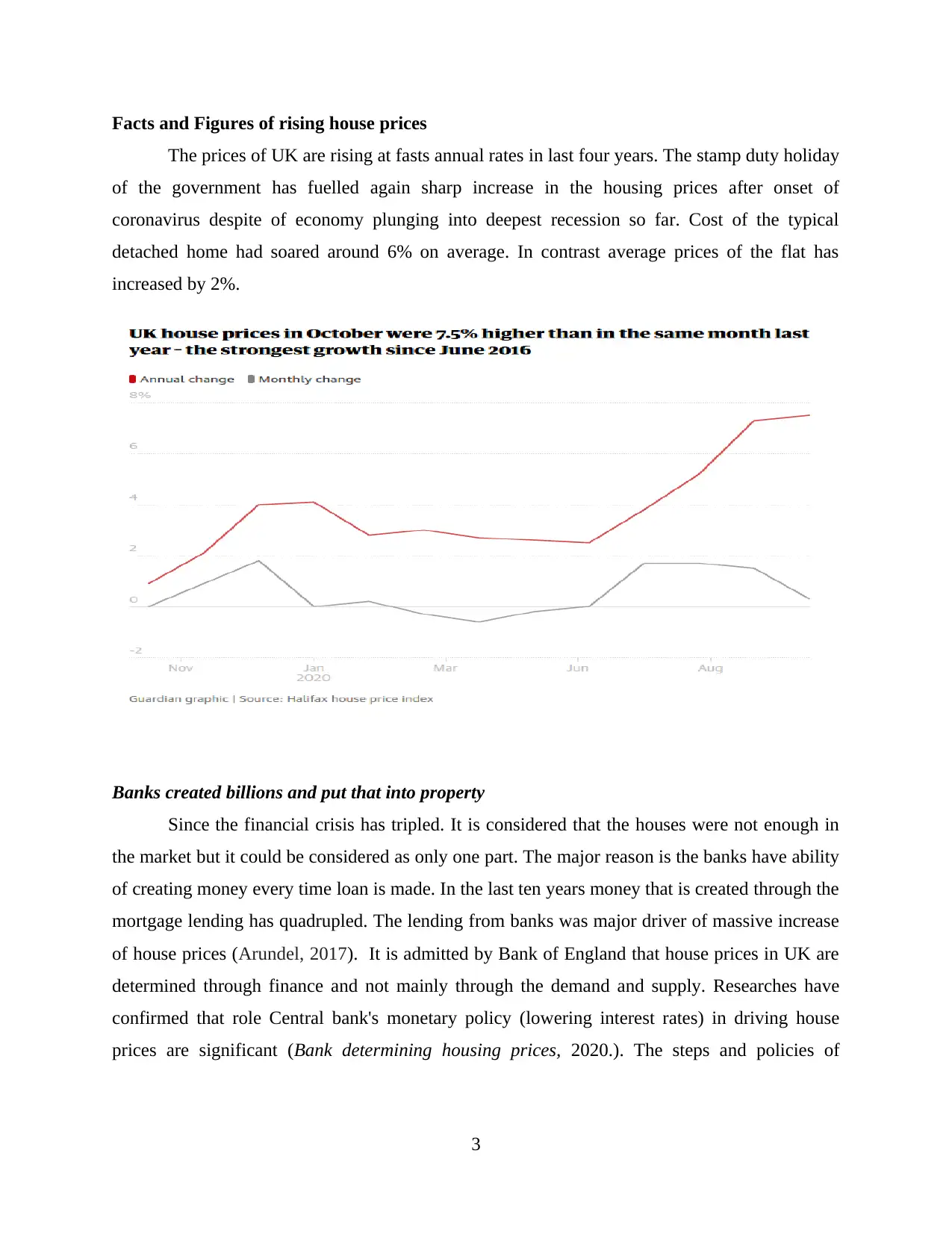
Facts and Figures of rising house prices
The prices of UK are rising at fasts annual rates in last four years. The stamp duty holiday
of the government has fuelled again sharp increase in the housing prices after onset of
coronavirus despite of economy plunging into deepest recession so far. Cost of the typical
detached home had soared around 6% on average. In contrast average prices of the flat has
increased by 2%.
Banks created billions and put that into property
Since the financial crisis has tripled. It is considered that the houses were not enough in
the market but it could be considered as only one part. The major reason is the banks have ability
of creating money every time loan is made. In the last ten years money that is created through the
mortgage lending has quadrupled. The lending from banks was major driver of massive increase
of house prices (Arundel, 2017). It is admitted by Bank of England that house prices in UK are
determined through finance and not mainly through the demand and supply. Researches have
confirmed that role Central bank's monetary policy (lowering interest rates) in driving house
prices are significant (Bank determining housing prices, 2020.). The steps and policies of
3
The prices of UK are rising at fasts annual rates in last four years. The stamp duty holiday
of the government has fuelled again sharp increase in the housing prices after onset of
coronavirus despite of economy plunging into deepest recession so far. Cost of the typical
detached home had soared around 6% on average. In contrast average prices of the flat has
increased by 2%.
Banks created billions and put that into property
Since the financial crisis has tripled. It is considered that the houses were not enough in
the market but it could be considered as only one part. The major reason is the banks have ability
of creating money every time loan is made. In the last ten years money that is created through the
mortgage lending has quadrupled. The lending from banks was major driver of massive increase
of house prices (Arundel, 2017). It is admitted by Bank of England that house prices in UK are
determined through finance and not mainly through the demand and supply. Researches have
confirmed that role Central bank's monetary policy (lowering interest rates) in driving house
prices are significant (Bank determining housing prices, 2020.). The steps and policies of
3
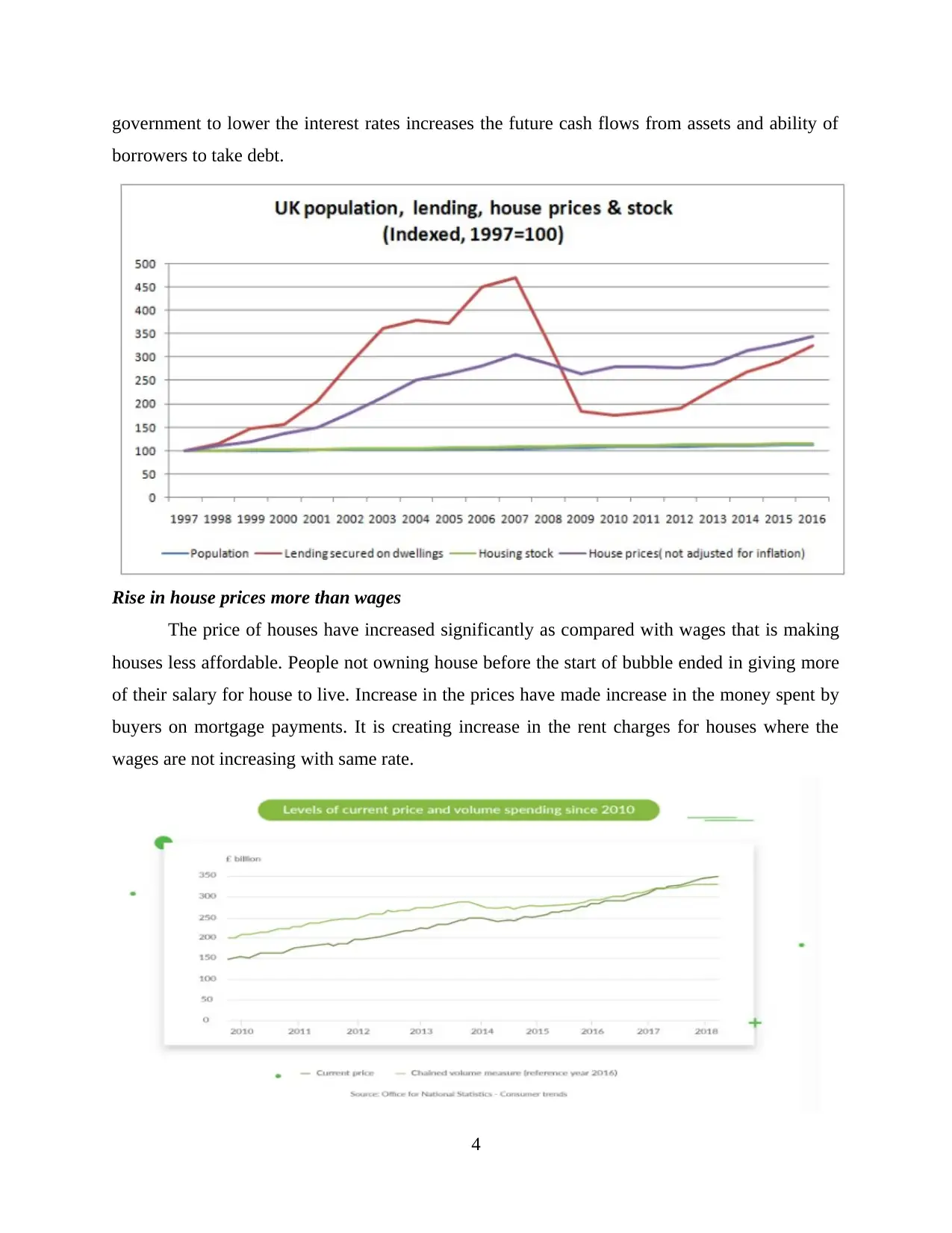
government to lower the interest rates increases the future cash flows from assets and ability of
borrowers to take debt.
Rise in house prices more than wages
The price of houses have increased significantly as compared with wages that is making
houses less affordable. People not owning house before the start of bubble ended in giving more
of their salary for house to live. Increase in the prices have made increase in the money spent by
buyers on mortgage payments. It is creating increase in the rent charges for houses where the
wages are not increasing with same rate.
4
borrowers to take debt.
Rise in house prices more than wages
The price of houses have increased significantly as compared with wages that is making
houses less affordable. People not owning house before the start of bubble ended in giving more
of their salary for house to live. Increase in the prices have made increase in the money spent by
buyers on mortgage payments. It is creating increase in the rent charges for houses where the
wages are not increasing with same rate.
4
⊘ This is a preview!⊘
Do you want full access?
Subscribe today to unlock all pages.

Trusted by 1+ million students worldwide
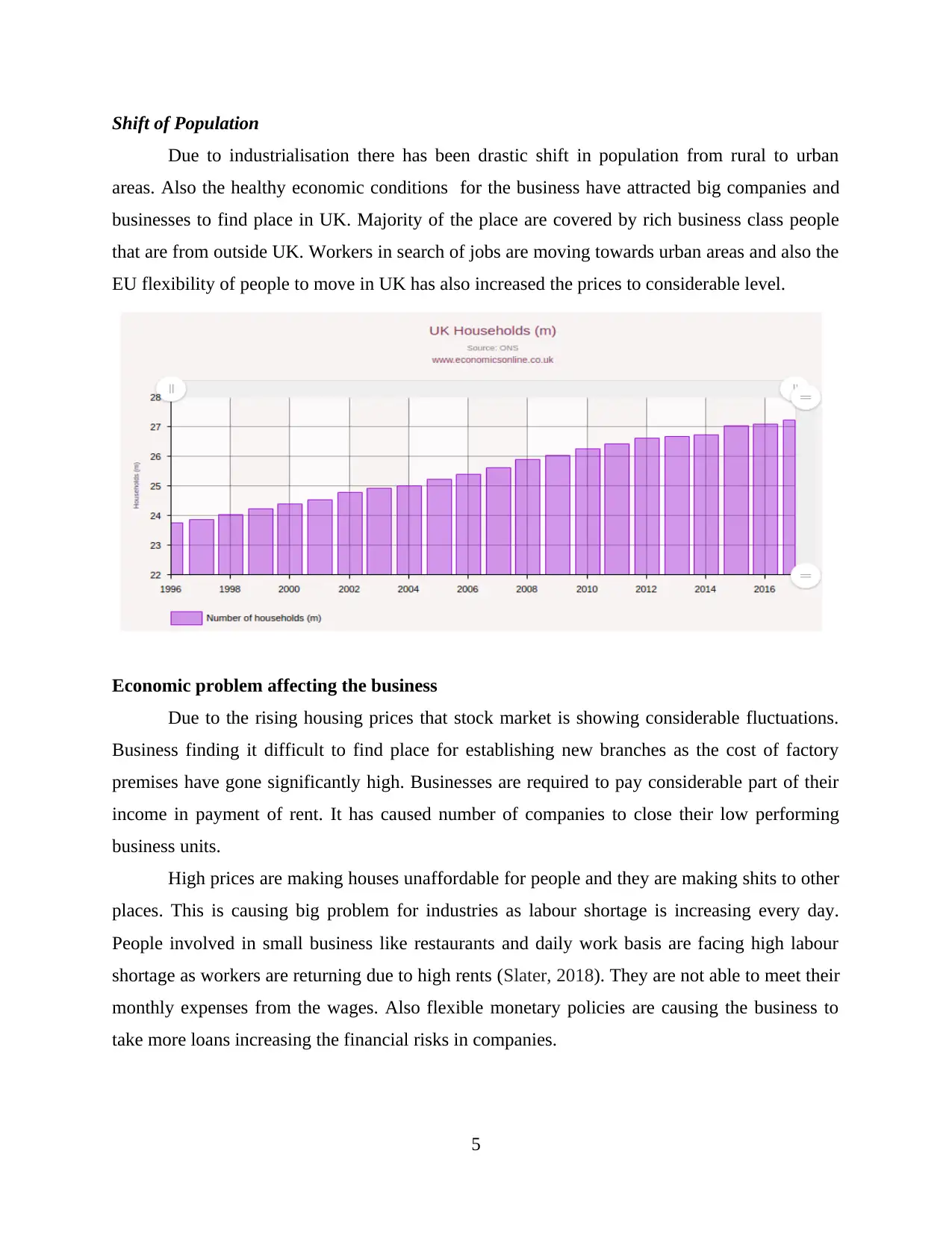
Shift of Population
Due to industrialisation there has been drastic shift in population from rural to urban
areas. Also the healthy economic conditions for the business have attracted big companies and
businesses to find place in UK. Majority of the place are covered by rich business class people
that are from outside UK. Workers in search of jobs are moving towards urban areas and also the
EU flexibility of people to move in UK has also increased the prices to considerable level.
Economic problem affecting the business
Due to the rising housing prices that stock market is showing considerable fluctuations.
Business finding it difficult to find place for establishing new branches as the cost of factory
premises have gone significantly high. Businesses are required to pay considerable part of their
income in payment of rent. It has caused number of companies to close their low performing
business units.
High prices are making houses unaffordable for people and they are making shits to other
places. This is causing big problem for industries as labour shortage is increasing every day.
People involved in small business like restaurants and daily work basis are facing high labour
shortage as workers are returning due to high rents (Slater, 2018). They are not able to meet their
monthly expenses from the wages. Also flexible monetary policies are causing the business to
take more loans increasing the financial risks in companies.
5
Due to industrialisation there has been drastic shift in population from rural to urban
areas. Also the healthy economic conditions for the business have attracted big companies and
businesses to find place in UK. Majority of the place are covered by rich business class people
that are from outside UK. Workers in search of jobs are moving towards urban areas and also the
EU flexibility of people to move in UK has also increased the prices to considerable level.
Economic problem affecting the business
Due to the rising housing prices that stock market is showing considerable fluctuations.
Business finding it difficult to find place for establishing new branches as the cost of factory
premises have gone significantly high. Businesses are required to pay considerable part of their
income in payment of rent. It has caused number of companies to close their low performing
business units.
High prices are making houses unaffordable for people and they are making shits to other
places. This is causing big problem for industries as labour shortage is increasing every day.
People involved in small business like restaurants and daily work basis are facing high labour
shortage as workers are returning due to high rents (Slater, 2018). They are not able to meet their
monthly expenses from the wages. Also flexible monetary policies are causing the business to
take more loans increasing the financial risks in companies.
5
Paraphrase This Document
Need a fresh take? Get an instant paraphrase of this document with our AI Paraphraser
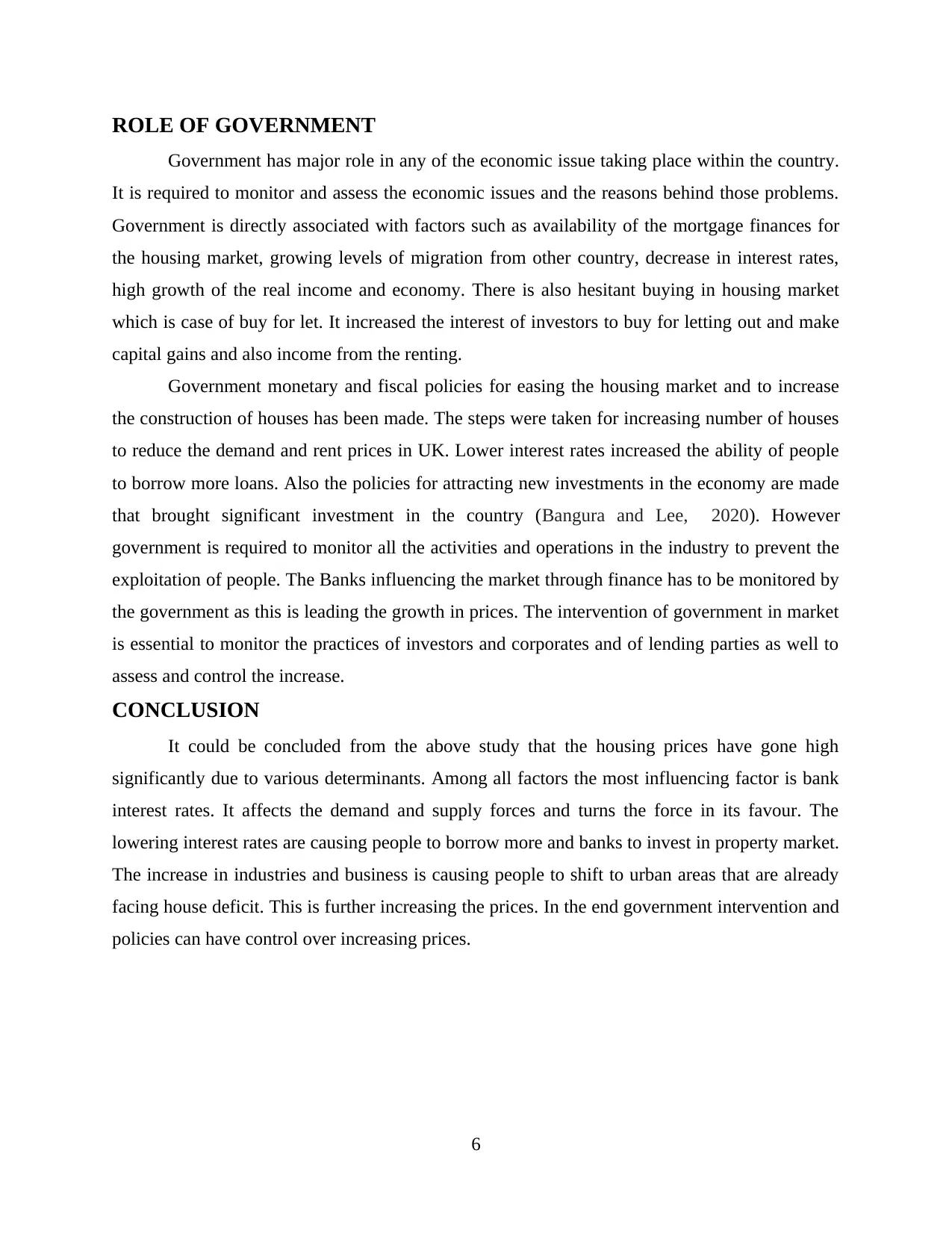
ROLE OF GOVERNMENT
Government has major role in any of the economic issue taking place within the country.
It is required to monitor and assess the economic issues and the reasons behind those problems.
Government is directly associated with factors such as availability of the mortgage finances for
the housing market, growing levels of migration from other country, decrease in interest rates,
high growth of the real income and economy. There is also hesitant buying in housing market
which is case of buy for let. It increased the interest of investors to buy for letting out and make
capital gains and also income from the renting.
Government monetary and fiscal policies for easing the housing market and to increase
the construction of houses has been made. The steps were taken for increasing number of houses
to reduce the demand and rent prices in UK. Lower interest rates increased the ability of people
to borrow more loans. Also the policies for attracting new investments in the economy are made
that brought significant investment in the country (Bangura and Lee, 2020). However
government is required to monitor all the activities and operations in the industry to prevent the
exploitation of people. The Banks influencing the market through finance has to be monitored by
the government as this is leading the growth in prices. The intervention of government in market
is essential to monitor the practices of investors and corporates and of lending parties as well to
assess and control the increase.
CONCLUSION
It could be concluded from the above study that the housing prices have gone high
significantly due to various determinants. Among all factors the most influencing factor is bank
interest rates. It affects the demand and supply forces and turns the force in its favour. The
lowering interest rates are causing people to borrow more and banks to invest in property market.
The increase in industries and business is causing people to shift to urban areas that are already
facing house deficit. This is further increasing the prices. In the end government intervention and
policies can have control over increasing prices.
6
Government has major role in any of the economic issue taking place within the country.
It is required to monitor and assess the economic issues and the reasons behind those problems.
Government is directly associated with factors such as availability of the mortgage finances for
the housing market, growing levels of migration from other country, decrease in interest rates,
high growth of the real income and economy. There is also hesitant buying in housing market
which is case of buy for let. It increased the interest of investors to buy for letting out and make
capital gains and also income from the renting.
Government monetary and fiscal policies for easing the housing market and to increase
the construction of houses has been made. The steps were taken for increasing number of houses
to reduce the demand and rent prices in UK. Lower interest rates increased the ability of people
to borrow more loans. Also the policies for attracting new investments in the economy are made
that brought significant investment in the country (Bangura and Lee, 2020). However
government is required to monitor all the activities and operations in the industry to prevent the
exploitation of people. The Banks influencing the market through finance has to be monitored by
the government as this is leading the growth in prices. The intervention of government in market
is essential to monitor the practices of investors and corporates and of lending parties as well to
assess and control the increase.
CONCLUSION
It could be concluded from the above study that the housing prices have gone high
significantly due to various determinants. Among all factors the most influencing factor is bank
interest rates. It affects the demand and supply forces and turns the force in its favour. The
lowering interest rates are causing people to borrow more and banks to invest in property market.
The increase in industries and business is causing people to shift to urban areas that are already
facing house deficit. This is further increasing the prices. In the end government intervention and
policies can have control over increasing prices.
6

7
⊘ This is a preview!⊘
Do you want full access?
Subscribe today to unlock all pages.

Trusted by 1+ million students worldwide
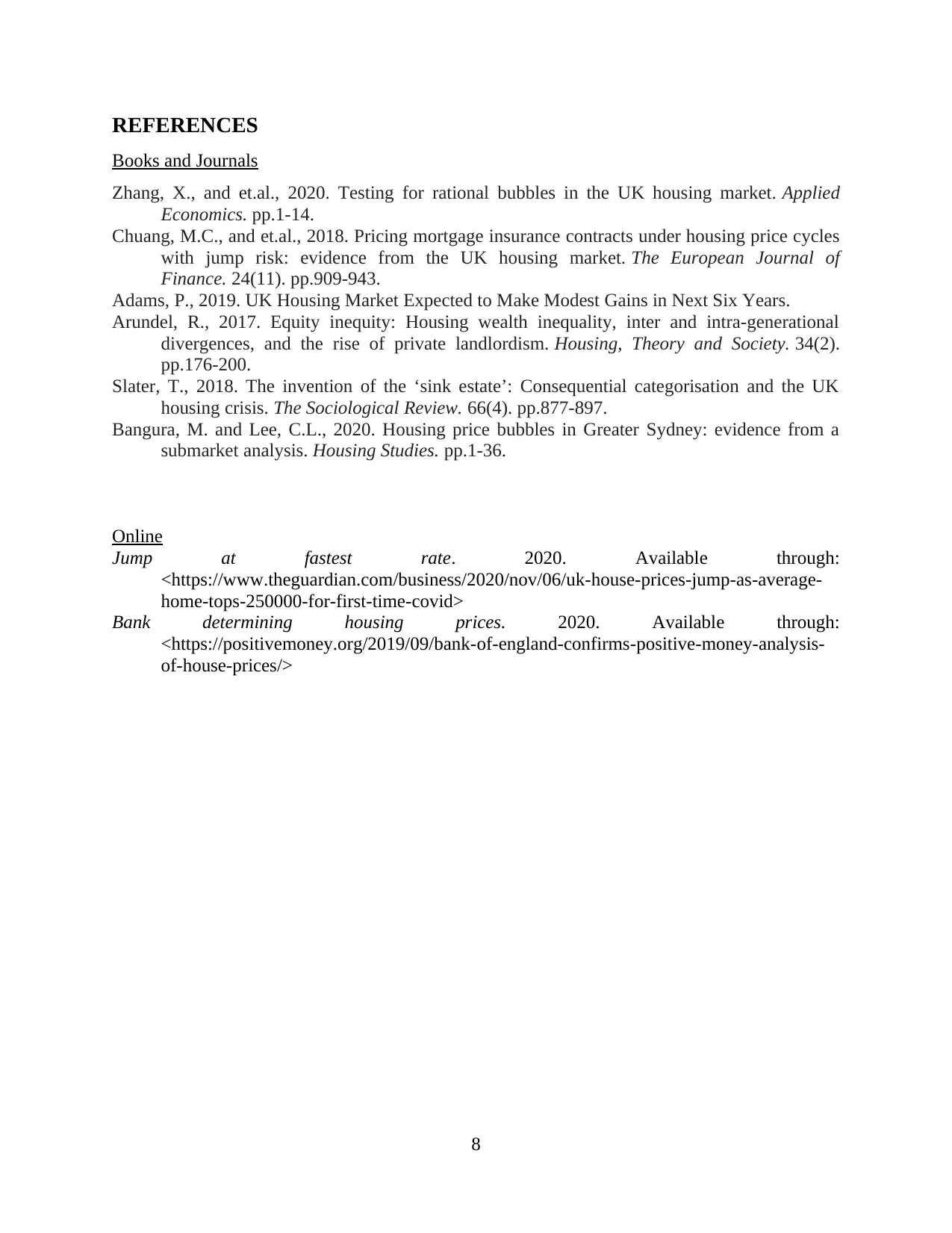
REFERENCES
Books and Journals
Zhang, X., and et.al., 2020. Testing for rational bubbles in the UK housing market. Applied
Economics. pp.1-14.
Chuang, M.C., and et.al., 2018. Pricing mortgage insurance contracts under housing price cycles
with jump risk: evidence from the UK housing market. The European Journal of
Finance. 24(11). pp.909-943.
Adams, P., 2019. UK Housing Market Expected to Make Modest Gains in Next Six Years.
Arundel, R., 2017. Equity inequity: Housing wealth inequality, inter and intra-generational
divergences, and the rise of private landlordism. Housing, Theory and Society. 34(2).
pp.176-200.
Slater, T., 2018. The invention of the ‘sink estate’: Consequential categorisation and the UK
housing crisis. The Sociological Review. 66(4). pp.877-897.
Bangura, M. and Lee, C.L., 2020. Housing price bubbles in Greater Sydney: evidence from a
submarket analysis. Housing Studies. pp.1-36.
Online
Jump at fastest rate. 2020. Available through:
<https://www.theguardian.com/business/2020/nov/06/uk-house-prices-jump-as-average-
home-tops-250000-for-first-time-covid>
Bank determining housing prices. 2020. Available through:
<https://positivemoney.org/2019/09/bank-of-england-confirms-positive-money-analysis-
of-house-prices/>
8
Books and Journals
Zhang, X., and et.al., 2020. Testing for rational bubbles in the UK housing market. Applied
Economics. pp.1-14.
Chuang, M.C., and et.al., 2018. Pricing mortgage insurance contracts under housing price cycles
with jump risk: evidence from the UK housing market. The European Journal of
Finance. 24(11). pp.909-943.
Adams, P., 2019. UK Housing Market Expected to Make Modest Gains in Next Six Years.
Arundel, R., 2017. Equity inequity: Housing wealth inequality, inter and intra-generational
divergences, and the rise of private landlordism. Housing, Theory and Society. 34(2).
pp.176-200.
Slater, T., 2018. The invention of the ‘sink estate’: Consequential categorisation and the UK
housing crisis. The Sociological Review. 66(4). pp.877-897.
Bangura, M. and Lee, C.L., 2020. Housing price bubbles in Greater Sydney: evidence from a
submarket analysis. Housing Studies. pp.1-36.
Online
Jump at fastest rate. 2020. Available through:
<https://www.theguardian.com/business/2020/nov/06/uk-house-prices-jump-as-average-
home-tops-250000-for-first-time-covid>
Bank determining housing prices. 2020. Available through:
<https://positivemoney.org/2019/09/bank-of-england-confirms-positive-money-analysis-
of-house-prices/>
8
1 out of 10
Related Documents
Your All-in-One AI-Powered Toolkit for Academic Success.
+13062052269
info@desklib.com
Available 24*7 on WhatsApp / Email
![[object Object]](/_next/static/media/star-bottom.7253800d.svg)
Unlock your academic potential
Copyright © 2020–2025 A2Z Services. All Rights Reserved. Developed and managed by ZUCOL.



